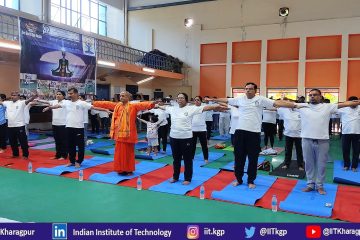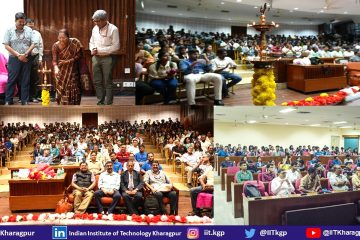
Times of India India Today Economic Times Energy Infra Post
In a major development that will lend impetus to the 2nd stage of India’s nuclear power programme, the Indira Gandhi Centre for Atomic Research, Kalpakkam, has entered into a collaboration with the Indian Institute of Technology Kharagpur to carry out research related to the design and development of Fast Breeder Reactors (FBRs). A dedicated IGCAR-IITKGP R&D cell has been set up under an MoU in the premises of IIT Kharagpur under the Advanced Technology Development Centre’s Structural Reliability Research Facility of IIT KGP to address the key issues in software and systems reliability, safety and security, health monitoring, materials and manufacturing.
IGCAR has been pursuing indigenous technology development for sodium-cooled FBRs since 1971 and has designed the country’s first techno-commercial demonstrator fast breeder reactor, the 500 MWe Prototype Fast Breeder Reactor (PFBR). The research collaboration with IIT Kharagpur will further the aim to functionalise the fully indigenous FBRs for the commercial production of nuclear power.
Commenting on the development, Dr Arun Kumar Bhaduri, Director, IGCAR said, “A strong research base exists in IITKGP in areas relevant to the fast breeder reactor technologies including performance and reliability assessment of structures, software and sensors & systems and rubber technology. IGCAR has already been interacting with the various departments at IITKGP. The collaboration will lead to indigenous design and development of reliable software, electronics and structures.”
Prof. Pallab Dasgupta, Dean, Sponsored Resesarch and Industry Consultancy, remarked, “The collaboration between IGCAR and IIT Kharagpur is of huge strategic importance. Research related to sodium based FBRs has several dimensions and IIT Kharagpur has the necessary expertise to provide R&D support to IGCAR in core areas like safety critical and reliable software, health monitoring of reactors, materials and manufacturing. This collaboration will require the collective expertise of our professors from diverse departments such as Computer Science and Engineering, Mechanical Engineering, Physics, Metallurgical & Material Engineering and Rubber Technology.”
IIT Kharagpur has a long history of working with IGCAR and other units of the Department of Atomic Energy but this is the first time that IIT KGP and IGCAR are coming together to strategically engage in research cutting across several domains of science & technology for the FBRs. Recalling the long standing collaboration with BARC and IGCAR leading to the creation of the Structural Reliability Research Facility of IIT KGP, Prof. Baidurya Bhattacharya, co-convenor of the IGCAR-IITKGP R&D Cell, noted that several key experimental and computational setups will be created through the new initiative to enable researchers at IIT Kharagpur to develop technology that can be easily translated into the FBRs.
About the importance of FBRs for meeting the energy needs of the country, Dr Bhaduri said, “FBRs are inevitable for long term security and sustainability of clean energy, particularly for a country like India with a moderate uranium reserves and large thorium reserves. An FBR produces its fuel simultaneously while burning fuel to produce energy in a closed loop. This makes nuclear energy effectively a renewable energy.”
Dr Arun Kumar Bhaduri, Director, IGCAR, on the IGCAR-IITKGP collaboration:
Why was it necessary to collaborate with IIT Kharagpur on the research related to FBRs?
Reply: A strong research base exists in IITKGP in areas relevant to the fast breeder reactor technologies including performance and reliability assessment of structures, software and sensors & systems, and rubber technology. IGCAR has been interacting with the various departments at IITKGP. With a desire to further strengthen and streamline the collaboration between the two institutes, the current MoU has been signed between IGCAR and IITKGP for executing advanced projects related to sodium cooled fast reactor.
Where will the collaboration lead to?
Reply: The collaboration will lead to indigenous design and development of reliable software, electronics and structures.
Are there any other institutions with which IGCAR is tying up for similar kind of research?
Reply: IGCAR pursues collaborative research with other premier institutes such as IITs & IISc in different areas of their core expertise relevant to FBR science and technology.
Why are FBRs so critical to India’s future in nuclear power generation?
India is committed to reduce its carbon emissions intensity by 33-35 percent by 2030 as well as increase the clean energy electricity capacity to about 40 percent of the total installed capacity in the same period. FBRs are inevitable for long term security and sustainability of clean energy, particularly for a country like India with a moderate uranium reserves and large thorium reserves. It produces its fuel simultaneously while burning fuel to produce energy in a closed loop. This makes nuclear energy effectively a renewable energy.
As the Director of IGCAR what is your vision regarding India’s nuclear future and the special role that an institution like IIT KGP can play in it?
Reply: In line with the three stage nuclear programme for India as envisioned by Dr. Bhabha, I strongly believe that the FBRs are going to play the most important role in the future of Indian Nuclear programme. Fast Breeder Reactors can, in principle, extract all the energy contained in uranium or thorium. An institution like IITKGP shoulders the responsibility with IGCAR for indigenous development of cutting edge technology required for safe and reliable operation of FBRs.
As an alumnus of IIT Kharagpur how do you think the institution will gain from such collaboration?
Collaboration of IITKGP with IGCAR provides exposure of challenging problems of cutting edge technology to the bright students and also provides them with the sense of pride in contributing to the programme of national importance.
Banner design: Suman Sutradhar



